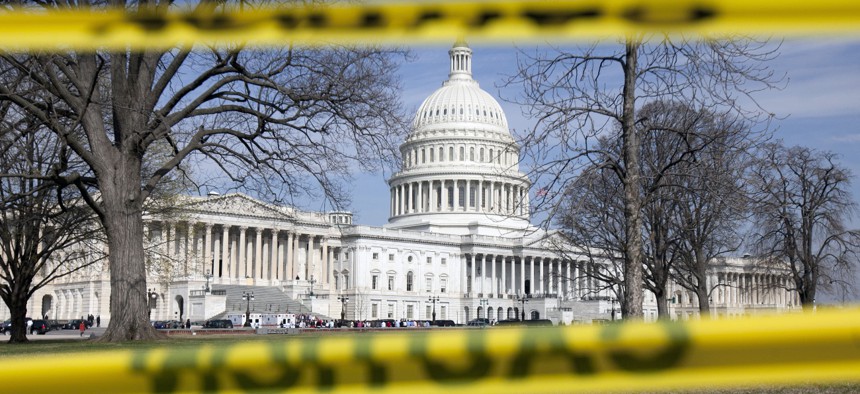Your guide to pay and benefits during a shutdown

A short-term measure to fund the government must be passed by Sept. 30 to avert a shutdown. Andrew Harrer/Bloomberg Creative Photos via Getty Images
Although lawmakers are loath to let appropriations lapse ahead of an election, complications remain over permitting reform and other measures expected to be included in legislation to keep the government open.
As of Thursday, lawmakers and the White House had just eight days to complete negotiations and pass a short-term measure to fund the government and avert a shutdown beginning next weekend.
Although lawmakers generally seek to avoid lapses in appropriations in election years, a number of issues have prevented them from reaching agreement thus far, including requests from the Biden administration for additional aid for Ukraine, coronavirus response funding, and the permitting reform proposal from Sen. Joe Manchin, D-W.V. Appropriators also are reportedly at odds over how long a continuing resolution should run, with conservatives urging the deal to go until 2023 in the hopes that Republicans gain majorities in the House and Senate.
Here is what federal employees can expect in terms of pay and benefits if the government shutters, based on guidance from the Office of Personnel Management, updated last year after a number of updates were signed into law following the 35-day partial government shutdown that began in late 2018.
Salaries: Furloughed federal workers and employees who have been deemed essential and forced to work during a lapse in appropriations will not be paid for the duration of the shutdown, although thanks to a 2019 law, they all will automatically be granted back pay to cover the shutdown once funding is restored. Congress previously had to approve back pay for furloughed federal workers following each shutdown, but that process was automated after the 2018-2019 appropriations lapse.
Similarly, employees who worked overtime during the shutdown will be granted premium pay, albeit not until the government is funded.
Bonuses: Agencies may award performance bonuses during a shutdown, but those awards won’t be paid until after the government reopens.
Unemployment: Federal workers who are furloughed are eligible for unemployment compensation in some states. But in many cases, they must return the money once they receive back pay.
Health care: Furloughed feds will maintain their coverage under the Federal Employees Health Benefits Program during a lapse in appropriations. Premiums accrue over the course of a shutdown, and then are taken out of employees’ first paycheck after the government reopens.
Similarly, employees enrolled in the Federal Employees Dental and Vision Insurance Program will maintain their coverage, with unpaid premiums being withheld from their first post-shutdown paycheck. This marks a shift from previous shutdowns, when—if the shutdown persisted for longer than two pay periods—insurance carriers could allow those employees’ policies to lapse.
Additionally, federal workers may now make changes to their insurance plans due to significant life events during a shutdown. Regulations issued by OPM in 2020 clarified that agency HR employees, previously furloughed during appropriations lapses, are deemed essential for the purposes of handling FEHBP enrollments.
Retirement benefits: Federal retirees in the Civil Service Retirement System and the Federal Employees Retirement System will still receive their scheduled annuity payments during a shutdown. Contributions to the Thrift Savings Plan will be paused until the government reopens.
Leave: Federal workers cannot substitute paid leave for unpaid furloughs when the government is closed. Previously scheduled leave that occurs during a lapse in appropriations will be cancelled, although OPM stressed that does not mean excepted employees cannot request time off during a lapse in appropriations.
“This does not mean that an excepted employee cannot seek approval to be excused from duty during a lapse,” OPM wrote. “An agency may excuse an excepted employee from duty and place the employee in furlough status for approved periods. An agency may allow an excepted employee to be off duty during periods when the employee was previously scheduled to be on paid leave.”






